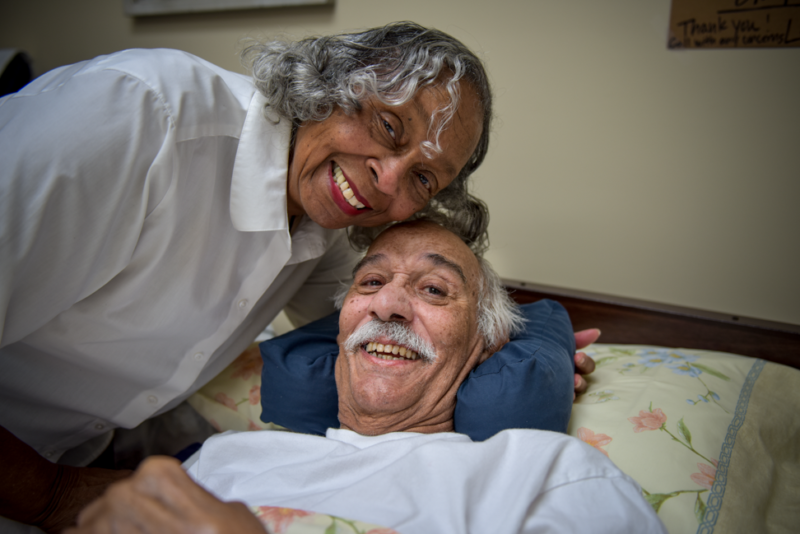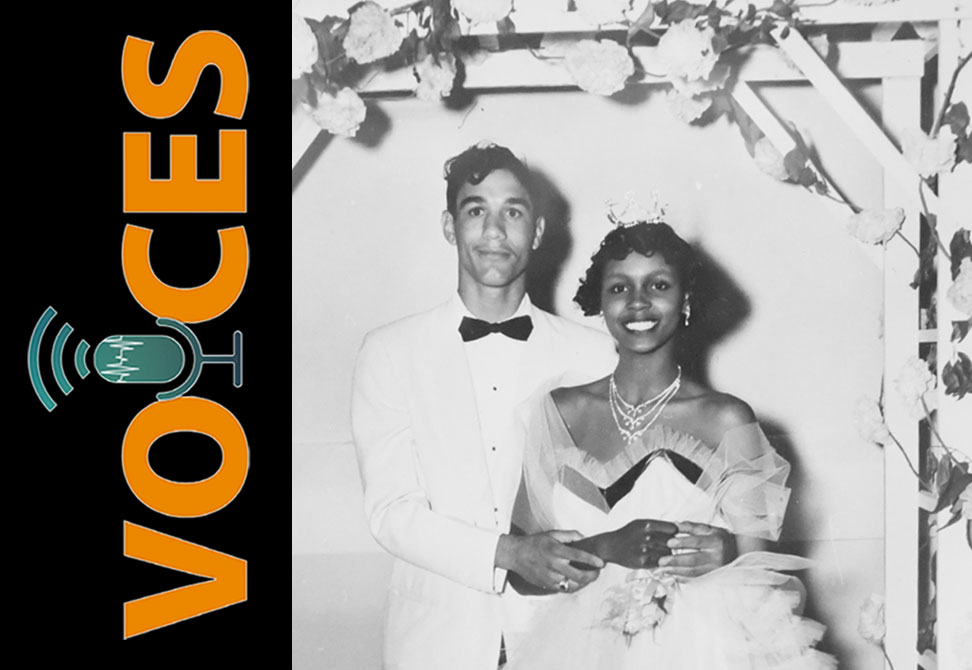In 1953, John and Beatrice met at Alexandria’s all-black high school, Parker-Gray. They fell in love against a backdrop of racial tension. They were young in an America that was on the precipice of change. Listen as John and Bea reminisce about a life lived in Alexandria as we wrap up our Black History Month series.
Bringing You the Voices That are the Heart and Soul of ACPS
VOICES is an audio series that shares the stories of our students, families and staff — in their words and in their voices. Everyone’s story is different. Success looks different for every person. VOICES celebrates these differences and successes by sharing the stories that are the heart and soul of ACPS. Listen to other stories in this series and subscribe to the VOICES podcast.
TRANSCRIPT
Interviewer: There’s a saying that goes something like this. When you meet the one who changes the way your heart beats dance with them to that rhythm for as long as the song lasts. It was 1953 when John spotted Beatrice across the library at Parker-Gray High School and he asked her to the school dance. That moment marked the beginning of a beautiful love story between two young people finding their way against a backdrop of racial tension in this city.
Interviewer: What’s your first memory of Beatrice?
John: Guess you were nice looking, friendly and just, we just happen to meet. I can’t give reason how or what. We just met one day in high school. She wanted to go to a, what we call a dance. She was, I told, I mean I told her, “You should go up upstairs.” She get back home and that was it. Can we start off from that?
Beatrice: And that was in the library, study hall. Mm-hmm (affirmative). And from then on it was always John and B, B and John. So, that was in 1953.
John: She say we’ve been married for 62 years.
 Beatrice: We’ve been married for 64 years.
Beatrice: We’ve been married for 64 years.
John: She say 64, two years or make no difference. Two years don’t make no difference. Yes.
Interviewer: What did he say to you in the library?
Beatrice: He just told me that if I wanted to go to a dance, that the dance, and we didn’t have a lot of social activities to go to
John: We didn’t, no.
Beatrice: … and this was on a Friday night and was down at the rec. They had a recreation center down the Berg and I didn’t go anywhere by myself.
John: She wouldn’t have let her. Her daddy wouldn’t have let her.
Beatrice: He was so strict with me. So somebody come back home with me at night. We got across the track and go down that way. So I said, “Yeah, I want to go to the dance.” So I left early and told my grandmother where I was going. I left early and went up to my girlfriend’s house, Barbara’s house on Columbus Street, 400 block North Columbus. And we left together to go down to the dance and it was time to come home. John brought me home, but I had to be home at a certain time.
John: Yeah. We all families knew each other because that was a close knit at the time. If you lived in The Berg or south side, north side or, we all knew each other.
Beatrice: And if you ever go past in the third, in around the corner from the Metro in Braddock Road, Braddock Road Metro. Around the corner of Whiff Street, the stoop, 1321-
John: That’s where she lived.
Beatrice: That’s where I lived and the stoop is still there. It used to be high but now it’s down and the house is still there too, 1321. And walk to school. The old, I mean the new Parker-Gray was right around the corner from us on Madison Street to Owen, was in the 900 block of Whiff Street. So we walked on up that way through the path, it was a narrow path and we had to be careful about going through that because men would hang out through that. And …
John: At that time they were called hobos.
Beatrice: Hobos, yeah. Mm-hmm (affirmative). Yeah. Would hang out there. So when they built Parker-Gray School, oh girl, that was like glory days. We had a music department, apartment house that Mrs. Smith, Ruby Smith, I think it’s Miss Ruby Smith used to teach you how to …
John: Home ec.
Beatrice: Yeah, Home Ec. Clean and cook. He took Home Ec, and I did too.
John: Yeah.
Beatrice: Most of our classes were together.
John: Yes.
Beatrice: Typing, business class we took it together. Gym was the same time, but of course it was separate, but just about all of our classes were together and… But that school was something, we had a large auditorium, a beautiful stage, a place where we could change our clothes for the gym. The girls had a separate bathroom and a big one, and the boys, I guess you all’s was big too.
John: Yes.
Beatrice: At the old Parker-Gray, it was like a dungeon.
John: Exactly right.
Beatrice: It was a dungeon.
John: Nothing but a dungeon.
Beatrice: It was a dungeon. You had classes in that part where the bathroom was and home ec was right off from that where Miss Smith taught her class. We had to cook and all. They taught you sowing and all, that was right there. We also had a course, believe it or not, to be a airline stewardess. And at that time blacks were not that. Black women were not, they have no pilots and they didn’t have no stewards on no planes or nothing. But we took that course. We took a driver’s ed course. No cars or nothing but our teacher was preparing us for things.
John: Yes.
Beatrice: She prepared us for things.
John: Why hasn’t anyone yet explained to me why they tore down the old Parker-Gray and put all that money into GW. Why they can’t explain it to me yet? Basically because we was a black school. They want to eliminate everything that blacks did. I don’t know. Have you been to the Black History Museum?
Beatrice: Mm-hmm (affirmative).
John: It is amazing, yeah?
Beatrice: Mm-hmm.Just think that was our library and it was one room. I don’t know if it was big as this room.
John: No, it wasn’t.
Beatrice: And we would go there or Miss Roberts was the, in charge of it then, and we would be sitting on the floor for stories and all like as children, little children. But they given us something, I think they pay a dollar a year for the library and the Watsons gave us the Watson’s house library. But that’s pitiful, but it still is something. It’s better than nothing. But still, that’s how to treat us. To pacify you.
John: At that time you couldn’t do any better.
Beatrice: No. Mm-mm (negative) .
John: Heck, we had to accept.
Beatrice: Mm-hmm (affirmative).
John: And I remember just vividly that the sit-in those guys did that open our noses. That none of them got arrested. None of them got arrested. And I had a part time job driving for Goodwin House, the secretary up there, she was in there then. Ended up in there. And she admired those guys so much. They didn’t give her no problem. Police came in, didn’t even know how to arrest, didn’t know how to arrest. But they would, how do they say, create problem because they were black.
Beatrice: Trespassing.
John: Yes. And they didn’t go home and go in a shaggy looking. They were dressed.
Beatrice: They were dressed.
John: They were dressed. I think that was our start of really desegregating our side. We had some good… I hate to say it the way I put it, but we had some good white people helped us too. Good white people who helped us. All white people ain’t bad. All black people ain’t bad. Just respect one another.
Beatrice: Mm-hmm (affirmative).
John: And when they came up with the schools they separate but equal. That wasn’t nothing. Nothing around. Nothing. So, that’s the way life goes. During those days, it was rough, but we didn’t know it was rough. I’m telling for the black kids, they were rough. We would have to walk from, I’ll say from Madison Street all the way to where the Lyles Crouch is now. No matter what kind of weather it was. And the white kids were in their buses driving past us, where we had to walk. So we thought it was fun at that time, but looking back it was a disgrace. Just to say back at that time, we just all got together and walk together. That’s what did it. When we went to school, to Parker-Gray President High School, we would get the old books from GW and they had written nothing nasty, they’d just written their name and they all in the books. We had to erase it out and then we turned to books in. We were fined 10 cents a page. Looking back, it wasn’t fun. It was fun then, but looking back, it just a disgrace.
Beatrice: And not only with the books were like that. The desks and chairs were carved up and they were giving us they considered new supplies, but that’s what we used to get.
John: Always second hand, always second. Nothing new. Nothing new. Again, again we thought it were funny, but it wasn’t, so. That school and name after TC Williams, I can’t see how they let it go on so far in this time of day. Change that name, man. We had a commencement exercise. He would come and stay 15 minutes and leave. He would never stay the whole thing. Always has something to do. And the way we were treated, again, looking back, it was a disgrace. That’s all. They had a school named Ficklin. Ficklin. You never hear about that school. My daughter were one of the first blacks to go there. And she had to have a, get a test from Richmond. See she passed the test, she …
Beatrice: For the first grade.
John: For the first, and she passed it with high color, luckily. And then my grandmother would walk to pick her up to take her to school every day. No matter weather was, what kind of weather. In 54, they went ahead and signed the paper for integration. My father when we had a meeting, so we had a meeting. He stood up on that floor said, “Integration, then fine, but it separate the black families.” It did. The teachers were supportive. We only had one high school. No matter where the blacks live, North, South, East, West. We all join in that one school. We may have went to different churches but we all went to one high school. Looking back that means closer. Very close. The teachers were close. It’s just that you don’t have that anymore. I think it again, we were the last in everything.
John: I played football over Parker-Gray. And then the head though, in the winter times you had hood to put on and on the bottom of it was, “The property of GW.” We got the second hand. Simply they did think like that. I don’t forget now. I don’t forget. Some players in the Alexandria we couldn’t go. Number one was Christ Church. We couldn’t go there. I worked for Metro. Before Metro, it was all over in DC.
John: DC transit. DC transit. That’s where I got hired from and then Metro took over. Then they had classes, the people they had charter classes. Then we came to Alexandria, I couldn’t go. That was in 55, 56, they had classes to go to an interesting places, but I take it back. I could go, but I refused to go because one time I couldn’t go. It just didn’t sit right with me. That’s all. We couldn’t go to Mount Vernon at one time. So things like that, ma’am, I don’t forget. It was a hurt thing, then. I mean now, but back then weeks accepted that. We had to, we had to accept it, that’s all.
John: But my father said integration is good, but also it’s bad. It separate the family, the schools, the churches and everything else. Like Reverend Martin Luther King said, suddenly it’s the most segregated a day in the world and the most segregated day at that time. The whites go to their churches, the blacks go to their churches, Chinese go to their churches, all of the sudden. It supposed to be a religious day. It just didn’t often work out that way. That’s all, ma’am. That’s all.
John: My mother and my father, the house they bought up on the Alpha Street four or six, is still standing. My sister and my nephew are still living in that house right now. And one time that was when it was called the house. All the kids would go, would come there. Give my father and my mother no problem at all. They were just having fun. Couldn’t go, had no other place to go. So, that was it. We are blessed and we’ve been blessed. And not just being blessed today. We have been blessed and didn’t realize it. We didn’t know what love was then. But now, I know what love is. I feel it and you can’t beat it. You can’t beat it. You just can’t beat it. I just can’t. This pain and this agony I go through now. It bothers me but I know this, got so much love around me. I know I do. I know I do. So, I guess that’s just our life story. That’s our life story.


